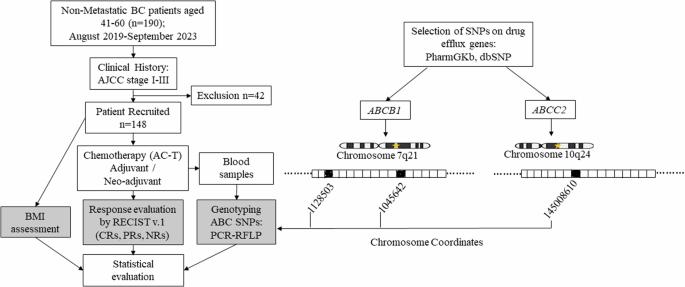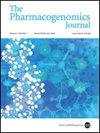低BMI和ABCC2基因型对序贯蒽环类-紫杉烷化疗乳腺癌患者临床疗效的影响:一项基于医院的研究
IF 2.9
3区 医学
Q2 GENETICS & HEREDITY
引用次数: 0
摘要
本研究探讨了低BMI和ABC基因多态性在BC患者治疗反应中可能的药理学影响的综合作用。在化疗开始前分析BMI。临床反应通过放射成像进行评估,并按照RECISTv进行分类。1标准。选择ABCB1和ABCC2基因的snp (C1236T、C3435T、C58626A)。采用PCR-RFLP对148例患者进行分析。在所有遗传模型中,ABCC2 (58626AA)与治疗无反应性显著相关,即显性(OR 2.954;(1.442 - -6.051);p = 0.003),隐性(OR 5.723;(2.48 - -13.20);P 2 21.219;P 2 8.657;p = 0.013)。PFS均为35.31个月;p = 0.005)和OS(39.75个月;p = 0.032)在AA基因型(ABCC2)患者中降低,而在低BMI患者中该基因型的危险风险进一步增加(HR 1.963)。ABCB1基因的3435CT基因型显示死亡风险降低87% (HR 0.13;p = 0.025)。在接受AC-T方案的BC患者中,低BMI单独或联合ABCC2基因58626AA基因型是化疗反应差和生存结局差的原因。总之,这项研究强调了遗传咨询和营养评估对良好治疗结果的重要性。本文章由计算机程序翻译,如有差异,请以英文原文为准。

Impact of low BMI and ABCC2 genotype on the clinical response of sequential anthracycline-taxane chemotherapy receiving breast cancer patients: a hospital-based study
This study investigates combine effect of low BMI and possible pharmacogenetic influence of ABC gene polymorphisms in treatment responses of BC patients. BMI was analysed prior to commencement of chemotherapy. Clinical response was evaluated by radiological imaging and categorised as per RECISTv.1 criteria. SNPs (C1236T, C3435T, C58626A) in ABCB1 and ABCC2 gene were selected. 148 patients were analysed using PCR-RFLP. ABCC2 (58626AA) was significantly associated with treatment non-responsiveness in all genetic models namely dominant (OR 2.954; [1.442–6.051]; p = 0.003), recessive (OR 5.723; [2.48–13.20]; p < 0.0001), codominant (χ2 21.219; p < 0.0001). The proportion of ORR and NRs were significantly different between low (<18.5) and high (≥18.5) BMI classes (OR 16.097; [7.12–36.35]; p < 0.0001). Furthermore, when treatment response was combined with BMI groups, significant associations were observed for C58626A SNP across all genetic models among low BMI group: dominant (OR 3.324; [1.012–10.406]; p = 0.041), recessive (OR 7.250; [1.533–34.278]; p = 0.012) and codominant (χ2 8.657; p = 0.013). Both PFS (35.31 months; p = 0.005) and OS (39.75 months; p = 0.032) were lowered among AA genotype (ABCC2) while the hazard risk of this genotype was further increased in low BMI patients (HR 1.963). 3435CT genotypes in ABCB1 gene showed 87% reduction in risk of death (HR 0.13; p = 0.025). Low BMI independently and jointly with 58626AA genotype of ABCC2 gene was responsible for poor chemotherapy response and survival outcome among AC-T regimen receiving BC patients. Together, this study underscores the importance of genetic counselling and nutritional assessment for favourable treatment outcomes.
求助全文
通过发布文献求助,成功后即可免费获取论文全文。
去求助
来源期刊

Pharmacogenomics Journal
医学-药学
CiteScore
7.20
自引率
0.00%
发文量
35
审稿时长
6-12 weeks
期刊介绍:
The Pharmacogenomics Journal is a print and electronic journal, which is dedicated to the rapid publication of original research on pharmacogenomics and its clinical applications.
Key areas of coverage include:
Personalized medicine
Effects of genetic variability on drug toxicity and efficacy
Identification and functional characterization of polymorphisms relevant to drug action
Pharmacodynamic and pharmacokinetic variations and drug efficacy
Integration of new developments in the genome project and proteomics into clinical medicine, pharmacology, and therapeutics
Clinical applications of genomic science
Identification of novel genomic targets for drug development
Potential benefits of pharmacogenomics.
 求助内容:
求助内容: 应助结果提醒方式:
应助结果提醒方式:


